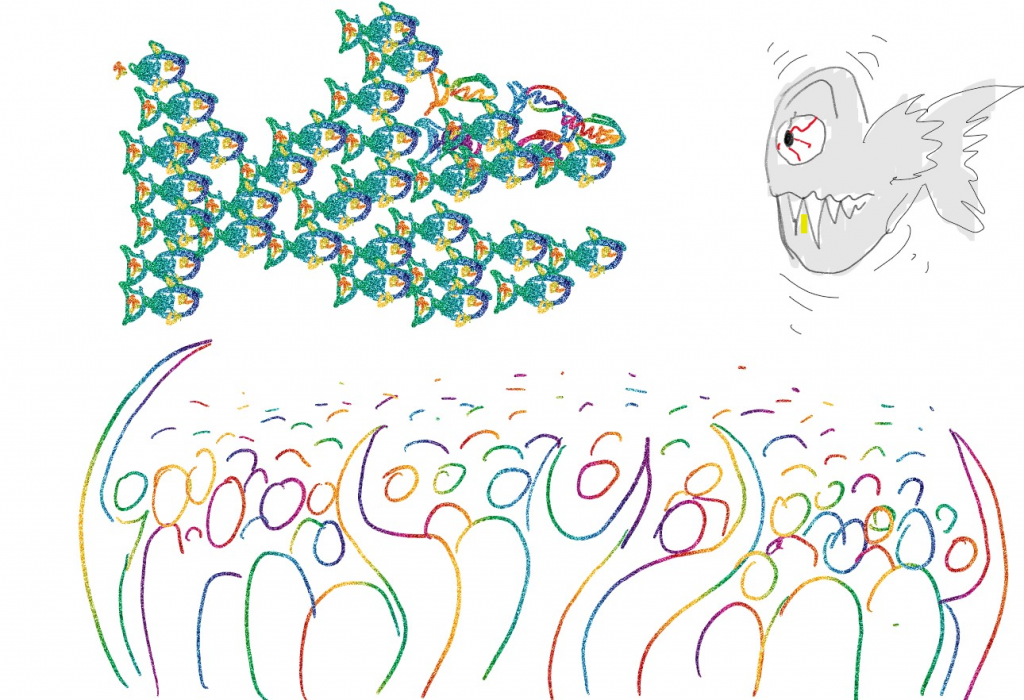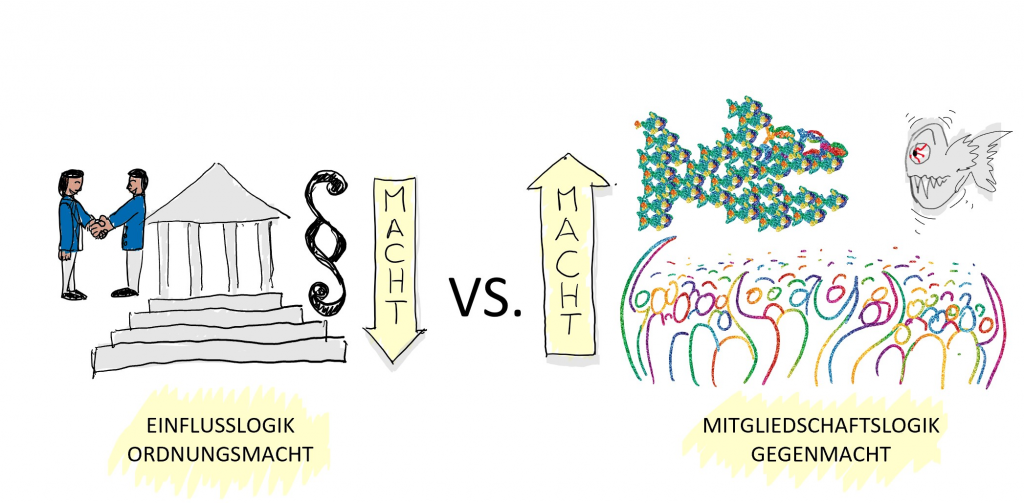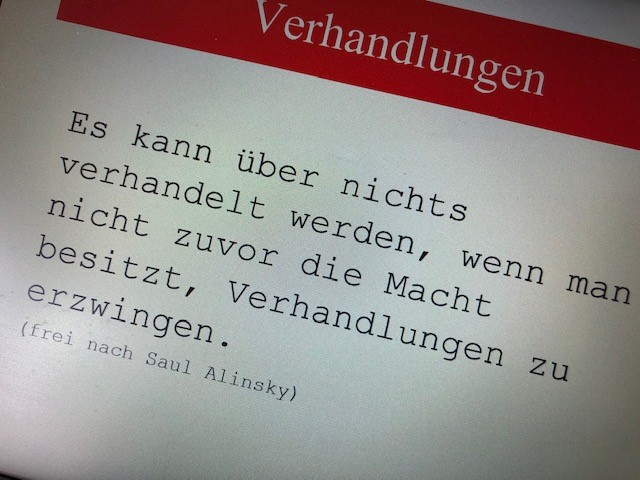
The balance of power in the interest of politics has changed. Dialogue between the social partners and influence on state legislation have dropped dramatically in importance. Trade union countervailing power must now be organised differently, and trade union education work also demands this!
Ever practiced countervailing power?
Where is the Archimedean point of power of the trade union movement in Austria? To give the answer straight away: in credible trade union possibilities for countervailing power in the companies!
What we trainers do every day in trade union education is political education! More than that, it is always education that aims at the innermost „empowerment“ of the participants. But mostly not in an obvious manner. To explicitly turn the „counter-)power“ question into a seminar or training subject is something that rarely happens. On this we now want to consciously work!
A project group consisting of education officers from all institutions responsible for trade union education (VÖGB, trade unions, chambers of labour) has for several months been working on the question: How do we develop competence for „countervailing power“ in our daily work with functionaries and works council members? This project is part of a larger strategy process in the ÖGB.
New power structures require new power strategies
The initial theory we are working with: In the past, trade union education has mainly served to train functionaries so that they can navigate professionally in the system of regulatory power. Regulatory power in the state refers to the role of trade unions as an acknowledged power factor, especially in questions of labour and social policy legislation. Regulatory power in the economic system means in the „social partnership“ to regulate income, working conditions and much more on an equal footing with the entrepreneurs.
What has been going on the last few years?
- Firstly: In the state, this function of the trade unions, namely to be a „regulatory power“, has been largely dried up by the government.
- Secondly: depending on the diagnosis, the social partnership is currently on intensive care unit or already dead as a doornail (at least this was true until the measures around the corona virus pandemic).
- The conclusion: what has been lost in terms of regulatory power must be replaced by „countervailing power“ in order to be able to have a positive effect together with the people who work – instead of, as before, merely for the people who work.
Trade unions „powered by“ countervailing power and membership logic
What does the term „countervailing power“ mean?
The term originally originates from Marxist theory, which describes how two classes face each other: the ruling class of the bourgeoisie and the proletariat. The ruling class has the power in society and the subordinate class of the proletariat has the historical task of building „countervailing power“ through self-organisation. In political science, the oppositional pair of ordering power – countervailing power is partly also described by another pair of terms: logic of influence versus logic of membership.

In the decades since 1945, the Austrian trade union movement has managed to achieve a great deal for the benefit of individuals, the economy and society by means of „influence logic“: Influence through trade unionists in government and ministries, in the parliamentary process, in the pre-parliamentary sphere in the drafting and evaluation of laws, through negotiations between functionaries within the framework of social partnership. The new situation is characterised by the fact that the capital side secures its interests and additional privileges directly, without negotiation, through the government. They are also actively trying to reduce co-determination in the works councils and trade unions (see: 12/60 hours working world).

The consequence: The basis is called upon! Membership logic is required. Under the new conditions, the only effective lever of the trade union movement is to say: „All wheels stand still if your strong arm wills it.“ If the influence in institutions is not enough to push through interests, then trade unions must be able to counteract and campaign. To be more precise: it must be able to act and campaign in the workplace. That is where it develops its full power and effectiveness, that is where – as I said in the introduction – its „Archimedean point“ lies. This requires trade union members who are willing to participate and take action. And it requires works councils and functionaries who are able to recognise, expand and activate their own power resources. The economic system follows the logic of buying and selling, profit or loss. Losses in production, services or markets, i.e. incalculable costs, must be threatened in a credible manner. Only then will an economic partner „on an ego trip“ once again be prepared to make compromises and to share profits generated by employees fairly.
What can we trainers do to promote countervailing power oriented education?
- Apply tools for self-reflection that allow the trainer to recognise his/her own positioning in the power structure of the company.
- Train works council members to be able to identify, analyse and assess the power resources that can be activated for them, in order to then incorporate them into a good strategy in the conflict of interests.
- Provide methodical and strategic impulses on how to build up a trade union basis of countervailing power in the company.
- Offer training sessions to prepare and reflect on actions and mobilisations.
- To work out in training courses and seminars how works council members and functionaries can become active in order to secure the support, trust, willingness to follow up and participation of those they represent.
- Teach theories and methods that help our target group to effectively address the interests, concerns and work-related emotions of people.
The next blog posts under this focus will offer methodological, didactic and theoretical suggestions and impulses for anchoring the countervailing power focus in our educational courses. Always keep in mind: Trade union education offers only a few ingredients to get countervailing power „baked“. In any case, it can take on the function of a propellant in this process… just like the sourdough in a tasty, airy bread that keeps longer.
Read more

- Gerhard Gstöttner-Hofer, Campaigns as an extension of the trade union strategy repertoire in Austria, Causes – Experiences – Findings, Vienna 2005
- Richard Ondraschek, What are trade unions? (VÖGB-Skripten – GK 1)
- Susanne Pernicka, The Austrian social partnership as an institutionalised arena of conflict between the logic of influence and membership, (AW-Blog, 13.12.2017)
These (and other) books can be ordered free of charge HERE in the Webshop of the ÖGB-Verlag.
Autor: Gerhard Gstöttner-Hofer
Translator: Astrid Donaubauer
Read original article in German!
Looking for more theory? Access to all the articles can be found HERE!

Dieses Werk ist lizenziert unter einer Creative Commons Namensnennung-NichtKommerziell-Weitergabe unter gleichen Bedingungen unter gleichen Bedingungen 3.0 Österreich Lizenz.
Volltext der Lizenz

